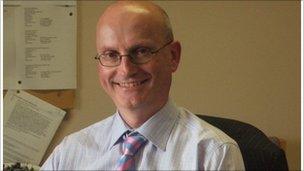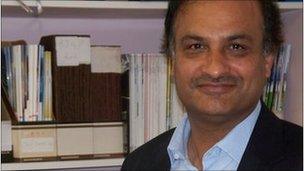'Many posts will go' at hospitals as efficiencies bite
- Published
How will the changes to the NHS in England affect services and patients at a local level?
That's the question I'm setting out to answer, as I track the reforms and efficiencies in Leicester over the next few years.

Malcolm Lowe-Lauri warns NHS posts will go
If the government succeeds in its stated aim of modernising the NHS to improve health outcomes, places like Leicester - where people die earlier than the national average - need to see the results.
It's never long before another patient arrives by ambulance at the Leicester Royal Infirmary. The busy hospital is one of three in the city run by Malcolm Lowe-Lauri.
He arrives slightly breathless for our interview, having paced upstairs from the medical assessment unit, where he was keeping an eye on a surge in cases.
Mr Lowe-Lauri has a busy in-tray. He is finalising an application for foundation trust status, which would give more freedom to University Hospitals of Leicester.
And he is working out how to meet the huge efficiency challenge set by the head of the NHS in England, Sir David Nicholson. In Leicester, this means generating savings of £158m over the next five years.
'Not good news'
Mr Lowe-Lauri said: "More than 60% of our costs are locked up in people.
"You cannot get away with dealing with the Nicholson challenge without significantly reducing the number of people employed in the health service.
"That may not be seen as good news - and nobody likes doing it - but that is the reality.
"The challenge is to do that in a civilised and effective way, but recognising that over five years there will be many posts that will go."
The estates and IT departments are likely to be reorganised - and there are plans to centralise pathology labs across the region.
Mr Lowe-Lauri stresses there are opportunities too.
Moving care away from hospital needs to become a reality. His team is meeting with colleagues in primary care every month to discuss how to re-design services.

Prof Azhar Farooqi is co-chair of the new GP consortium in Leicester
And he feels Leicester is well-placed to cope with change because it doesn't have bills from a PFI (Private Finance Initiative) development.
Mr Lowe-Lauri is among the experts putting the finishing touches to their recommendations on how the government should change its troubled Health and Social Care Bill.
Losing the plot
He said: "It's no good getting the legislation right and losing the plot on the money.
"In a sense, this is an industry trying to become aware of its need to become a service."
My next stop is a surgery in deprived east Leicester.
Azhar Farooqi is a professor in primary care - and he works there as a GP three days a week.
He's also co-chair of the GP consortium, which will take over organising care in Leicester during the next two years, with a budget of £400m.
Some experienced primary care colleagues are already leaving the NHS. Professor Farooqi said: "I know the NHS well, but I'm not so familiar with the local authority and social care.
"In the new world we'll work closely with them, so that's an area I'm having to learn quite a lot about.
"The Health and Social Care Bill needs to be more explicit about the role of public and patients. That's really important in how the local population holds health professionals to account."

Ballu Patel is concerned about the future
And for his part, he told me the consortium would hold its meetings in public once it's up and running.
A couple of miles away at the Peepul Centre, where gym memberships cost just £20 a month, I met Ballu Patel.
Over-prescribing
He helped establish the airy building, and he chairs the Leicester Mercury Patients' Panel, which was set up by the local paper.
Mr Patel thinks the government's listening exercise will tweak the reforms rather than fundamentally change them.
And his panel members fear the consortium may target GP prescribing if it needs to save money.
He said: "Much of the commissioning money will go to the hospital providers. So there's not much room for negotiation outside those contracts - and the consortium will have to look internally for savings.
"The next headline budget is prescribing. So will pressure be put on GPs if they're seen to be over-prescribing?"